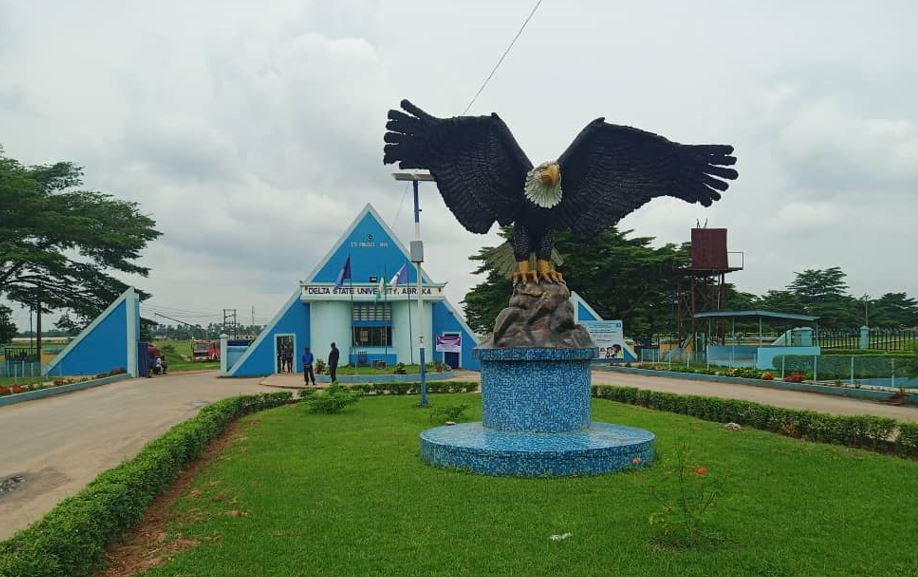The management of Delta State University (DELSU), Abraka, has suspended a 200-level Biotechnology student, identified as Ezi Ugoma, for four semesters after she was accused of filming a fellow student in distress and posting the video on TikTok.
The incident, which reportedly occurred at the university health centre, has sparked heated debates among students, parents, and education stakeholders about the boundaries of social media use, campus ethics, and privacy rights.
The Incident That Shocked the Campus
According to reports from the institution, the female student, Ugoma, allegedly recorded a disturbing video showing a fellow female student in a critical condition, believed to be battling complications related to an unsafe abortion. Instead of offering help or seeking immediate medical assistance, Ugoma allegedly chose to capture the distressing moment on her mobile phone and upload it to TikTok.
The video, which quickly went viral across several social media platforms, triggered widespread outrage, both within and outside the campus community. Many condemned the act as insensitive and inhumane, accusing the student of chasing social media attention at the expense of human dignity.
The university management, upon learning of the viral video, swiftly launched an investigation into the matter to determine the authenticity of the claims and identify those involved.
DELSU’s Disciplinary Committee Acts Swiftly
Following internal investigations, the case was brought before the Students’ Disciplinary Committee (SDC) — the university body responsible for handling all cases of student misconduct. The SDC convened on August 21, 22, and 25, 2025, to deliberate extensively on the incident.
After a thorough review of the evidence presented, including the viral video and witness testimonies, the Committee found Ugoma guilty of gross misconduct. The committee ruled that her actions constituted a serious violation of the university’s matriculation oath and brought the institution’s image into disrepute.
The SDC recommended that the student be rusticated for four semesters, equivalent to two academic sessions, starting from the 2025/2026 session. The Vice-Chancellor of the university, Professor Samuel O. Asagba, reviewed the report and approved the decision, making the suspension official.
Official Statement and Grounds for Suspension
The letter conveying the disciplinary action was dated October 21, 2025, and signed by the university authorities. It clearly outlined the reason behind the sanction, stating that the act of filming a dying student and uploading it on social media amounted to “gross misconduct” and was a direct violation of the student code of ethics.
The university described the behaviour as “inhumane, unethical, and a breach of student decorum,” further emphasizing that such actions “have the potential to tarnish the image of the university and undermine the core values of respect and discipline.”
The management reiterated its zero-tolerance policy for acts that bring disrepute to the institution or harm its reputation in the public eye. This decisive action, they stated, should serve as a deterrent to other students who misuse social media or engage in conduct unbecoming of a university student.
Student’s Step-Father Reacts Angrily
In a surprising twist, the development took a personal toll on the student’s family. Reports indicate that Ugoma’s step-father expressed deep disappointment over her conduct and the resulting punishment. In his reaction, he allegedly declared that he would no longer sponsor her education, effectively withdrawing financial support.
He reportedly told her to “prepare to return to her village,” a statement that has generated mixed reactions online, with some Nigerians sympathizing with the student while others maintained that she must face the consequences of her actions.
Campus Reactions and Student Opinions
The news of Ugoma’s suspension spread rapidly across the DELSU campuses, sparking debates among students and staff.
Some students supported the university’s decision, describing it as “just and necessary” to protect the institution’s image and discourage similar behaviour. According to them, the act of filming a dying colleague instead of offering help was heartless and violated every moral and humanitarian standard expected within a learning environment.
Others, however, argued that while the student’s actions were wrong, a four-semester rustication might be too severe, especially considering her academic future and the possibility that she acted without fully understanding the consequences.
One student leader who spoke anonymously said, “The punishment is harsh but fair. DELSU has a reputation to protect, and we must all learn to be responsible with our phones and social media activities.”
Broader Implications: The Role of Social Media in Campus Misconduct
This case sheds light on the growing challenge of social media misuse among university students in Nigeria. Many young people today use platforms like TikTok, Instagram, and Snapchat to chase viral fame, often without regard for ethics, consent, or privacy.
Experts believe the DELSU case underscores the urgent need for universities to strengthen their digital conduct policies and sensitize students on responsible online behaviour.
Social media may be a powerful tool for communication and creativity, but when misused, it can lead to academic sanctions, reputational damage, and even legal consequences.



